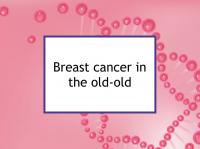Breast cancer in very old women (≥ 85) is not well understood. While such cancer has a reputation for lack of aggressiveness, old women appear to benefit from treatment to the extent they can tolerate it. Now a new study has described characteristics of breast cancer presentation in very old women and outline the differences between those with a history of breast cancer and those without.
Breast cancer survivors are at risk of developing a recurrence of their original cancer, and are also at a higher risk of developing a new primary breast cancer. It can be difficult to determine whether or not such a tumor is a recurrence.
New primary breast cancer or late recurrence?
New breast tumors found more than 10 years after a previous breast cancer diagnosis fall into two possible categories. Either the tumor is a late recurrence of the original disease or it is a new primary tumor. A new primary may arise due to similar risk factors and circumstances as the original tumor.
Although a long passage of time since the original diagnosis is suggestive of a new primary, very late recurrences do occur, especially in the case of ER+/PR+ disease. A new tumor located in the same quadrant of the same breast as the original tumor increases the likelihood that it is a local recurrence. Pathological similarities and differences between the tumors are not definitive. Discordance between the receptor status of an original tumor and its metastases is fairly common. For example, breast cancer that was originally ER+/PR+/HER2+ can metastasize to ER+/PR/HER2- or other receptor combinations as the disease progresses. In any case, additional testing will be performed to detect possible distant metastases so that appropriate treatment can be given.
Latest research finds second cancers can occur very late
The retrospective study referenced above was designed to investigate the characteristics of breast cancer diagnosed in women aged 85 or older, taking into account whether they have a history of breast cancer. Data is limited concerning very old patients and mammographic screening guidelines are inconsistent for them.
To conduct the study, the authors performed a review of all female patients aged at least 85 who consulted a breast surgeon for a definitive diagnosis after initial screening or testing indicated the presence of breast cancer. The study included 132 patients with average age 88 diagnosed from the beginning of 2009 to September 30, 2024. A total of 96 (68%) of the women had never been diagnosed with breast cancer previously whereas 42 (32%) had been diagnosed and treated for breast cancer in the past.
Fifty-seven percent of the women with a history of breast cancer were diagnosed as a result of screening imaging such as mammograms compared to 31% of the women with no prior history. In other words, old women who had previously been treated for breast cancer were more likely to continue breast cancer surveillance. On the other hand, study participants without a history of breast cancer were more likely to be diagnosed based on breast symptoms, increasing the likelihood of diagnosis at a more advanced stage of the disease.
An average of 14.6 years separated the first and second cancers when a new tumor occurred in same breast as the original tumor. An average of 19.2 years passed when a new tumor was found in the opposite breast. These results indicate that subsequent breast cancer tends to occur quite late in older women with a history of breast cancer. The authors comment that their findings raises the question of how long surveillance should continue after a breast cancer diagnosis in older patients and whether screening guidelines for older women should take into account any prior history of breast cancer.
Please see our article on breast cancer in old age and the late recurrence tag for more information.
